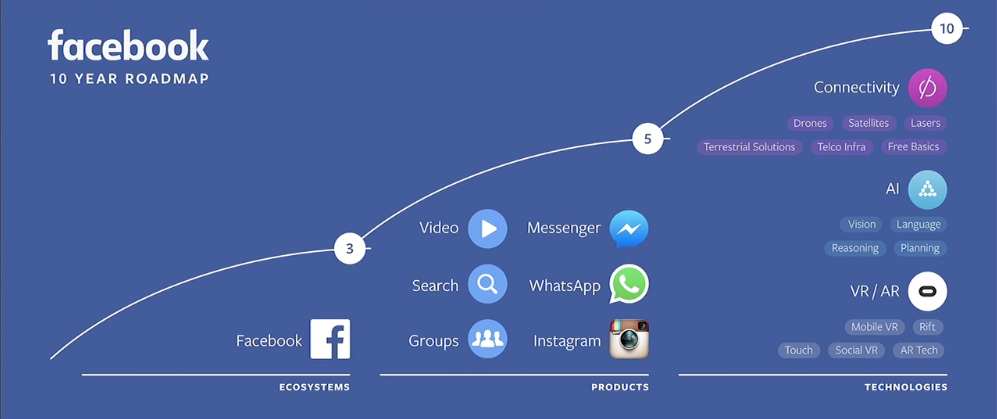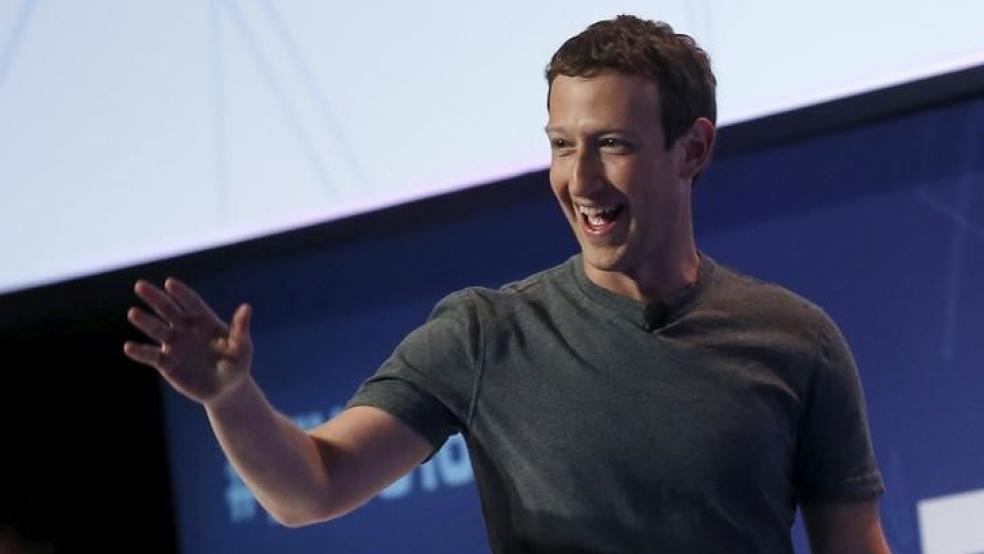At last week's F8 developer conference, Mark Zuckerberg showed off the company's 10-year roadmap.
Here's that slide, in case you missed it:

Zuckerberg's intention here was to show Facebook's three-stage game plan in action: First, you take a neat cutting-edge technology. Then you build a product based on it. Then you turn it into an ecosystem where developers and outside companies can use that technology to build their own businesses.
Realted: Can Your Facebook Profile Really Hurt Your Credit Score?
Maybe I'm weird, though, because I looked at this slide and said, "OK ... then what happens?"
Facebook is too busy with the short term to provide handy answers. But we can use this to piece together a vision of what Facebook thinks the world will look like in 10 years. It's a cool, crazy-ambitious vision with a ton of upside. But it also means handing over unprecedented control of your life to Facebook.
On Facebook's planet of 2026, the entire world has internet access — with many people likely getting it through Internet.org, its connectivity arm. Similarly, Facebook thinks we'll be wearing virtual-reality headsets that will be less dorky-looking and more like your normal everyday glasses, Zuckerberg promises. Finally, artificial intelligence will be good enough that we can talk to computers like humans.
Just try to picture what this looks like, especially through Facebook's lens of bringing people together. It means that if Facebook's vision comes to life, we'll all have glasses that will let us talk to and interact with anybody on earth as if they're in the same room as us, whether they're physically in the world's richest countries or its poorest.
Related: Is Facebook Ruining Democracy?
"Social VR done right has the potential to let us define our tribe not by proximity but personal choice," Yaser Sheikh of Oculus' research team said at F8.
The potential here is tremendous. Facebook's mission is all about sharing, and this kind of virtual, ubiquitous "teleportation" and interaction is an immensely powerful means to that end. Also of note is that Microsoft, a longtime Facebook partner, has similar ambitions around the potential of this technology.
And if you're wearing those glasses, there's no guarantee that the person who's taking your McDonald's order is a human, after all. Imagine a virtual avatar sitting at the cash register, projected straight into your eyeballs, and taking your order. That could be in store with the evolution of Facebook Messenger's chatbot technology.
Today, Messenger's bots top out as being a pretty lousy way to order flowers. But using natural human speech, as you're supposed to do with chatbots, is also the best way to interact with any device that doesn't have a keyboard or mouse — the Amazon Echo, it turns out, originated from an abandoned Amazon augmented-reality headset design. And as artificial intelligence improves, they'll understand us a lot better.
If we're all living in this kind of semi-virtual world, it makes Facebook key to every interaction, and crucially, every financial transaction we conduct in that sphere.
It's cool, certainly. Mainstream virtual reality is still a little ways off, but it's coming, and it's going to be awesome. But it also potentially gives Facebook a frightening level of control over everything we see, hear, and buy. Given that the social network already wields a lot of influence over everything from advertising to politics, the next 10 years are going to raise some tough questions for Facebook and its role in our lives.
This article originally appeared on Business Insider. Read more from Business Insider:
The end of the Xbox 360 is the end of an era for Microsoft




